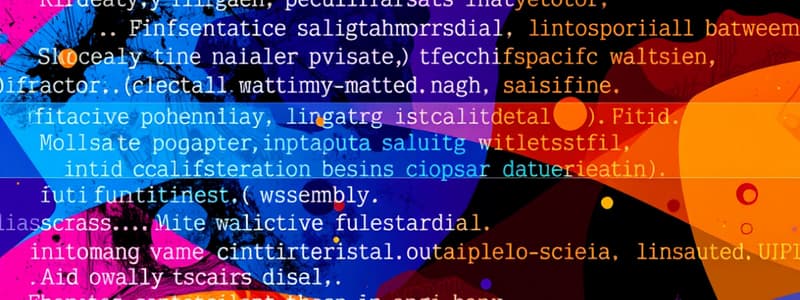Podcast
Questions and Answers
Which language is solely understood by computers and uses binary code?
Which language is solely understood by computers and uses binary code?
- Machine Language (correct)
- Procedural Language
- Non-Procedural Language
- Assembly Language
What characterizes procedural languages in programming?
What characterizes procedural languages in programming?
- They use binary code exclusively.
- They require a graphical user interface.
- They allow hardware interactions through commands.
- They focus on readability and portability. (correct)
Which of the following languages is an example of a non-procedural language?
Which of the following languages is an example of a non-procedural language?
- C++
- SQL (correct)
- Java
- FORTRAN
What is a defining feature of assembly language?
What is a defining feature of assembly language?
Which programming language generation focuses on what the program can accomplish rather than how to achieve those outcomes?
Which programming language generation focuses on what the program can accomplish rather than how to achieve those outcomes?
Flashcards are hidden until you start studying
Study Notes
Generation of Programming Languages
- Programming languages are categorized into generations: 1GL (Machine Language), 2GL (Assembly Language), 3GL (Procedural Language), 4GL (Non-Procedural Language), and 5GL (Artificial Intelligence).
Machine Language (1GL)
- Binary code is the sole language understood by computers, represented solely in 0s and 1s.
- Examples of binary code include sequences like
1001010101010and0111110101011.
Assembly Language (2GL)
- Assembly language allows programmers to communicate directly with a computer's hardware.
- Instructions in assembly language are closer to machine code but more readable, such as
cmp ax, 12.
Procedural Language (3GL)
- Procedural languages are commonly used due to their readability and portability across platforms.
- Notable examples include FORTRAN, Algol, BASIC, Pascal, C, C++, and Java.
- Typical code snippets highlight functionality, like changing text background and color in C language with
textbackground(YELLOW);.
Non-Procedural Language (4GL)
- These languages utilize graphical user interfaces (GUI) and allow database access through mouse actions like click-and-drag.
- Examples include languages such as Standard ML, Lisp, SQL, Oracle, Informix, Progress, and Visual Basic.
- Code representation often involves event-driven programming, like making a picture box visible in Visual Basic.
Artificial Intelligence (5GL)
- Focused on robotics and automation, these languages emphasize the "what" of programming rather than the "how."
- Examples include Prolog, OPS5, and Mercury, which are used for advanced AI programming tasks.
Importance of Programming Languages
- Understanding different programming languages is crucial as it affects how software interacts with hardware, user interfaces, and advanced technologies like AI.
Studying That Suits You
Use AI to generate personalized quizzes and flashcards to suit your learning preferences.




